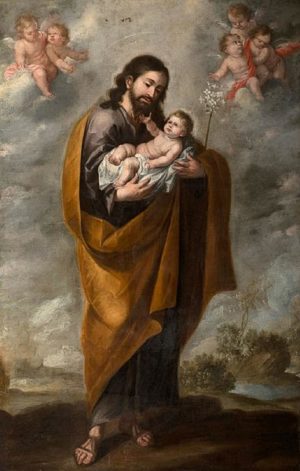Why Honor St. Joseph?
“We must be convinced that, in consideration of his great merits, God will not refuse St. Joseph any grace he asks for those who honor him.”
ST. ALPHONSUS LIGUORI
Our Lord and Savior Jesus Christ chose to enter the world through the human family; He came as an infant born into the marriage and home of the two holiest human creatures who ever lived: Joseph and Mary.
Although He was God, He was obedient to them as a Child, and under their watchful care “Jesus advanced in wisdom, and age, and grace with God and men” (Luke 2:51-52). In this Jesus gave us an example, that we too as His disciples are meant to entrust ourselves to Joseph and Mary, learning from them how to grow in holiness as the adopted children of God (Eph. 1:5).
As Christians we are blessed to have sweet Mary as our spiritual mother and valiant Joseph as our spiritual father. Just as Mary guides us from heaven with loving devotion, so too St. Joseph diligently provides for the needs of the family of God, the Holy Catholic Church.
Because of his special role as foster-father of the Child Jesus, St. Joseph has merited singular privileges in heaven unmatched by any saint excepting the Blessed Virgin Mary. Certain saints have received special insight into his holiness and the wonderful power of his heavenly intercession.
The Catholic Church as always fostered a tender to St. Joseph as the Head of the Holy Family; yet he has become increasingly prominent in the spiritual life of the Church over the last 150 years, as Fr. Donald Calloway, MIC, lists in his new book, Consecration to St. Joseph: The Wonders of Our Spiritual Father:
- 1870 – Blessed Pope Pius IX declares St. Joseph the “Universal Patron of the Church.”
- 1879 – Apparitions at Knock, Ireland. St. Joseph appears with the Blessed Virgin Mary, St. John the Apostle, and Jesus (appearing as the Lamb of God).
- 1889 – Pope Leo XIII writes Quamquam Pluries, an encyclical letter on St. Joseph.
- 1908 – St. Luigi Guanella begins constructing a church dedicated to St. Joseph in Rome. It is completed and consecrated as a basilica in 1912.
- 1917 – Apparitions at Fatima, Portugal. During the last apparition on October 13, St. Joseph appears holding the Child Jesus and blessing the world.
- 1921 – Pope Benedict XV inserts the phrase “Blessed be St. Joseph, her most chaste spouse” into the Divine Praises.
- 1955 – Venerable Pope Pius XII establishes the Feast of St. Joseph the Worker, to be celebrated on May 1.
- 1962 – Pope St. John XXIII inserts St. Joseph’s name into the Canon of the Mass (Eucharistic Prayer I).
- 1989 – Pope St. John Paul II writes Redemptoris Custos, an encyclical letter on St. Joseph.
- 2013 – Pope Francis, echoing and fulfilling the intentions of Pope Emeritus Benedict XVI, inserts the name of St. Joseph into all Eucharistic Prayers. He also consecrates Vatican City State to St. Joseph.
Through this providential sequence of events, it’s clear that the Holy Spirit is at work teaching us the importance of devotion to St. Joseph at this moment in salvation history. “Now is the time of St. Joseph!” writes Father Calloway, “In our day, Jesus wants the Church to know, love, honor, and seek refuge in the spiritual fatherhood of St. Joseph.”
Homily: St. Joseph is No Ordinary Saint
Homily for the Solemnity of Mary, Mother of God, January 1, 2020, at St. Ann Catholic Church
As we come to the end of the gloriously peaceful Octave of Christmas in which we’ve meditated upon our Lord’s Incarnation and birth, Holy Mother Church reminds us today of the indispensable role of His virginal and immaculate Mother.
To be sure, Our Lady is no ordinary mother, for she is the only woman who experienced the joys of motherhood while keeping a virgin’s honor – and not only at our Lord’s conception, but as well through His birth and even after His birth. And so important is this belief in our Lady’s perpetual virginity that it is one of the four dogmatic Marian teachings – teachings that we, as Catholics, are absolutely bound to believe and hold as true.
While many of our Protestant brethren may scoff at this belief – not to mention the lukewarm, the atheistic, and agnostic of the world – those of us formed in authentic Catholic belief and piety have no qualms believing in the absolute purity of Our Lady.
Knowing her exalted status and position in the economy of salvation, knowing as we do that man would not be redeemed without her fiat at Nazareth, we understand her perpetual virginity as something perfectly fitting with her sublime dignity. Why wouldn’t the mother of our Lord be the holiest and purest member of humanity? Yet as we come to this particular New Year, you’ll forgive me if I do not focus so much on Our Lady today as I do on the one whom God gave to Our Lady to protect her honor.
I speak, of course, of good St. Joseph, who in this Year of our Lord 2020, enjoys a special honor in our diocese. Beginning with today’s feast, we now enter into the Year of St. Joseph, a time to reflect more deeply on his virtues and his place in the economy of salvation. It’s a year, as well, to entrust ourselves, our families, our parish, and our entire diocese more confidently into St. Joseph’s capable hands, ever trusting that he who was given charge of Jesus and Mary during their lives on earth, will take just as good of care of us! Whereas St. Joseph’s role on earth was to lead, protect, provide, guide, and love his spouse and his earthly Son, he does the same now for the Body of Christ from Heaven – which is why he’s the Patron of the Universal Church and why we can trust him with our needs!
To this end the great mystic, St. Teresa of Ávila, once said of St. Joseph: “I do not remember that I have ever asked anything of him which he has failed to grant.” Truly, despite his humble occupation as a carpenter, St. Joseph was no ordinary man. A direct descendent of King David, St. Joseph was of noble lineage. But even more important than his noble ancestry was his noble character. For while St. Joseph’s lineage fulfilled the prophesy that the Messiah would come from the House of David, it was ultimately because of his humility and virtue that St. Joseph was chosen by God to be our Lord’s earthly father.
Fittingly, many saints and theologians have made great claims about the sanctity of St. Joseph. In fact, both St. Augustine and St. Thomas Aquinas taught that St. Joseph was a virgin, asserting thereby that it was virtue, and not the loss of virility from old age, that enabled good St. Joseph to live in perfect continence with the most beautiful of all women. Yet though a virgin, like Our Lady, St. Joseph was a parent nonetheless. He was fruitful in a way superior to normal procreative means, yet a true father nonetheless.
In fact, St. Josemaria Escrivá defends the true fatherhood of St. Joseph, stating: “Our Lord was not born of the seed of Joseph. Yet of the piety and charity of Joseph a son was born to him, of the Virgin Mary, and this was the Son of God.” In other words, St. Joseph’s fatherhood of Jesus is not a fatherhood according to the flesh, but a fatherhood according to holiness. The virility of St. Joseph finds it origins in his charity. Yet his unique fatherhood is no less authentic, for it stems from his authentic marriage to the Blessed Virgin Mary and from his unique role in the economy of salvation.
Thus, St. Joseph’s unique fatherhood is not something any man could hope to achieve. It’s something entirely particular to him, as is ever fitting for the one designated by God from all eternity to provide the paternal solicitude and care to Christ. Because of St. Joseph’s unique role in the life of Jesus, many saintly popes, theologians, and doctors of the Church have even stated that St. Joseph never committed an actual sin in his life, venial or mortal. In fact, some have even gone so far to state that, though St. Joseph was conceived with original sin like the rest of us, God cleansed him of all sin immediately afterwards by the future merits of Christ’s Paschal Mystery. Thus, much like Our Lady, St. Joseph was able to live the entirety of his life in perfect purity, inflamed with love for God.
While this is not a teaching of the Church or something that one must believe, it’s a theological speculation that makes a lot of sense. Should not the earthly father of Jesus enjoy certain privileges just like His mother? Should not the one who would guide the Savior in His manhood not enjoy a touch of divinity? Doesn’t it make sense that the earthly father of our Lord be extraordinarily holy? Ultimately, what I want you to understand is that St. Joseph is no ordinary saint. And because he fulfilled perfectly his very unique and special role in the economy of salvation, St. Joseph now enjoys a very special place in Heaven and is therefore a powerful intercessor. Truly, the gift of his unique paternity was a gift not only to the members of the Holy Family, but to us as well – a paternity that he exercises generously as the Patron of the Universal Church. And so we have every reason to trust in his paternal care.
My dear brothers and sisters, our good bishop has seen fit to designate this year as the Year of St. Joseph for our diocese. I believe this to be an act of providence, especially considering both the state of the Church and the state of our country. There can be no doubt that the evil one is having a field day right now with so many Church leaders, with so many of our elected officials, with the media and with so many elements of our society. Our world is in need of divine help.
With this Year of St. Joseph, we are being invited by our bishop to place our trust in the saint whom God the Father trusted above all else: St. Joseph. Let’s do the same with great confidence and love. If St. Joseph can guide, protect, and provide for our Lord and His Immaculate Mother, he can guide, protect, and provide for us as well. So in this new year, let’s all make a commitment to pray to St. Joseph every day, entrusting all our cares and worries to him, while also striving to imitate his virtues.
St. Joseph, pray for us!

